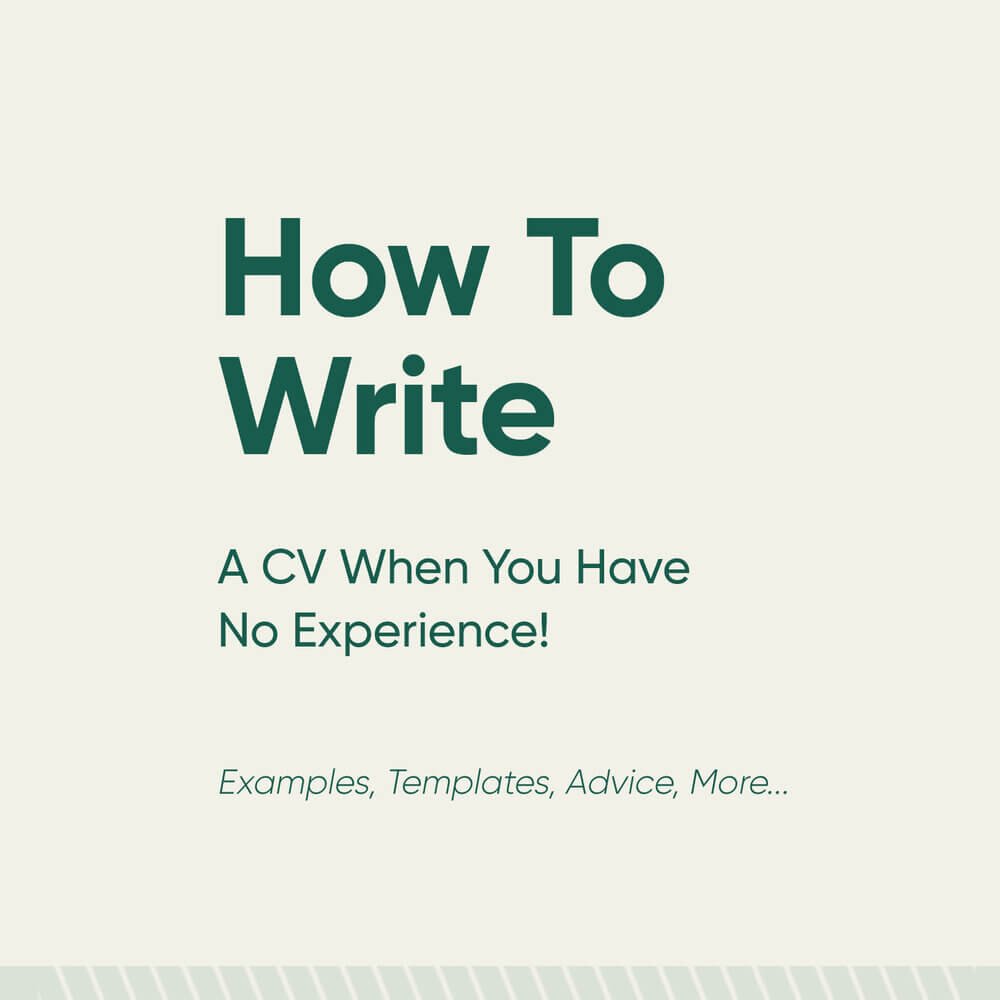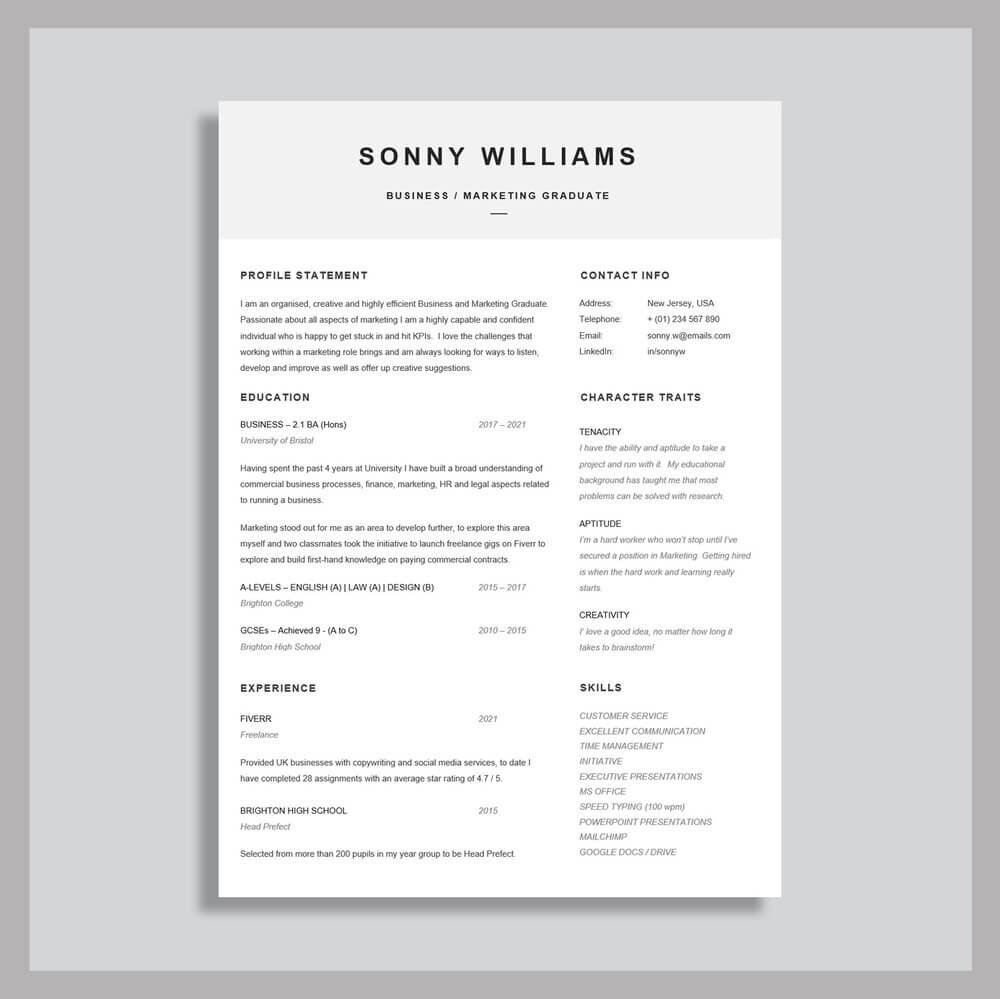There is an unwritten rule that recruiters follow when it comes to assessing individuals applying for jobs.
Experience.
The higher up the food chain you go, the more experience is required. To be expected, but the real problem lies with the entry level jobs in which many claim that ‘no prior experience’ is necessary, yet somehow, you’ll always find yourself being rejected because “Other candidates had a lot more experience”.
Have you ever clicked a job advert for an entry level role only to find the recruiter is asking for 3 years of experience? Argh - Frustrating!
Indeed, it’s a tough, competitive world out there (and one that’s getting tougher). But the job market can be unlocked with the key being your CV. A superbly written, structured and designed CV will take your career a long way and help you stand-out among the crowds.
You’re probably already asking, “But what can I put on my CV if I don’t have any proper experience”? Well, in the following points we will show you exactly what to do by providing you not only with a guide but also ‘CV’s With No Experience Examples.’
Whether you’re a student fresh out of university, a teenager still in school or someone looking for their first entry level role creating a CV can be a daunting process. However, follow these steps and you will give yourself the best possible chance to succeed.
In Summary, How to write a CV with no experience…
Be clear with what you want
Overcome “The Experience” Problem
Write your CV, tailor it to the job
Include volunteering or extracurricular activities
Keywords are key words. Use CV Mirroring
Be enthusiastic - use your active voice
Download a No experience free CV Template
Get some design inspiration - Best CV Designs will help you stand-out
If all else fails get some experience, Tips on what to do.
Now for the detailed version…
1. Be Clear With What You Want
Before you boot up Word and start physically writing your brand-new perfected CV, you must consider what kind of role you’re looking for.
Some of you may be applying for a part-time job in a bar or supermarket to help you earn a bit of money whilst studying, Others may be considering their first step for their career, and therefore this CV could be make or break for getting where you want to be in life.
Either way, having a clear vision on what you want in life is extremely important as it will provide clarity and purpose when you come to write your document..
So, the first thing you need to do is to spend some time thinking about what you want to do in your future, do some research, speak to people that know you and ask them what character traits they see in you, what interests you, why are you applying for jobs. All these questions are important.
Your next position may have a real impact on your complete career and future, seriously your first job could shape your whole career without you ever really realising it. For regular readers of my blog you may have seen this old adage before…
“People may spend their whole lives climbing the ladder of success only to find, once they reach the top, that the ladder is leaning against the wrong wall.”
2. Overcoming “The Experience” Problem
Okay, so we’re aware that the main stumbling block is your experience. But don’t worry, not having any work experience doesn’t mean that you can’t get the job.
Consider to yourself whether you’re overthinking what counts as experience? Often when we think of work experience, we think of something related to the job we’re applying for.
Have you done any volunteering, charity work or anything productive in your spare time – it all counts towards your experience.
The best thing is, roles that are set at entry level typically look for transferable skills in your CV. Recruiters are aware that for these types of jobs you’re not going to have a whole lot of experience, and therefore they scan your CV for key transferable skills.
Have you done anything where you’ve needed to communicate effectively? Have you spent time away from home which required independent thinking? How organised are you - what have you done than demonstrates this?
All of these are transferable skills that employers are dying to hire. If you show drive, ambition and aptitude these transferable skills can be tailored into your CV and designed to appeal to the employers hiring for them with their jobs – don’t worry, you’ll get hired in no time irrespective of how much job experience that you have.
3. Writing Your CV – Tailoring to the job.
When you’re applying to a job with no experience, you’re going to have to do a bit of extra work with reading the job description. You’ll want to be picking out all of the key skills that the specification includes so that you can show an employer that you too have those skills, whether in your CV or personal statement.
It is super important that recruiters see you’re not just applying with a general CV, even if you have no experience. Make it personal to the job that you’re applying to by using the same key skills that they are requiring and talk about them in your CV – what have you done in your life that means you possess these skills?
A top tip would be to print out the job description, go through and highlight the skills that area essential to the role. Then write them out on a separate piece of paper and work out how you can show those skills are in your possession.
This approach is know as CV mirroring and is a very effective method for creating a CV with eye-catching information.
By mirroring the same terminology that recruiters use in their job adverts will subconsciously give you an edge, as when recruiters skim read your CV they will notice valuable matches at a glance. When you’ve only got a few seconds to catch the eye of a recruiter you need to make it count!
4. Volunteer & Extracurricular Activities
Have you volunteered at your local animal shelter? Perhaps, taken part in a long-distanced run for charity?
It is time that you start looking at extracurricular activities like jobs. They are most likely the things that are giving you skills that are desirable in the workplace besides your school or college.
There are 3 main reasons why to include volunteer and extracurricular experience:
It shows you’re passionate
It shows you’re empathetic
It shows your socially conscious
All of above are extremely desirable traits to have. When you have no experience, it is important to highlight that you have these in your skill set. Whether playing in a football team, volunteering at school or somewhere in town, it has given you valuable skills.
Volunteering experience is a must for those with no experience.
5. Keywords
With larger companies, their internal recruitment teams will often use technology to automatically grade applications, these systems are called applicant tracking systems or ATSs
Essentially, an ATS is a program that scans your CV for words that the recruiter is looking for. Say, for example, a recruiter has listed that they need leadership qualities, you would need to use terms that reflected this in your CV to score points. The more matches on your CV to the job description the more points you score and the higher the chance of having your CV read by a human.
If you’ve used synonyms for the words that they’re looking for, there is a chance that your CV will be skipped. So, again, this is where CV mirroring is important, therefore make sure you use the exact same wording that is listed in the job advert.
Recruiters use an ATS so that they can skim through CVs far more quickly. So, get ahead of the game and use those keywords, on this note - How do you feel about algorithms filtering your job applications? Personally I’m dead against it, read my thoughts and feel free to join the discussion over on Linkedin.
6. Enthusiasm
Experience isn’t necessarily everything – especially when you’re applying for entry level jobs. Whether you’re a student, graduate or someone looking to get into full-time work, you’ve got to show your employer that you want to get the job.
When you’re writing your CV and/or cover letter ensure that you are always using positive language. Make sure your recruiter understands the energy that you have.
If you’ve had accomplishments whether it be with volunteer work, schoolwork or extra-curricular activities, show in your CV that you are proud of achieving them.
The best way to show enthusiasm in by writing your CV in the active voice. That’s not to say you absolutely have to but writing in the passive voice can make for a boring read that just won’t show off your personality as well.
7. No Experience CV Template Free Download
No guide on how to write a CV template with no experience would be complete without a free download. Included below is a link to download the following Word template...
8. CV With No Experience Examples (Stand-Out Designs)
If you’re looking for something a little more eye-catching then try some of the following designs on for size.
As a continuation to CV Mirroring, take things a step further by using a design that reflects the industry you want to work in. Neutral colours and white space work particularly well for professional sectors, see how the following example is concise, to the point and very profession…
You can download the Harding CV Template here.
For more creative sectors (Graphic Design, Marketing, PR etc.) consider adding hints of colour and a less traditional look and feel (the aim of the game is to be noticed remember).
You can download the above Compton CV Template here.
When choosing a CV design pick one that you’re confident with, there is nothing wrong with playing it safe, however equally don’t be afraid to mix things up and take a more radical approach should the interviews not come flooding through.
Remember the aim is to get noticed!
9. What if having no experience is a deal-breaker?
The chances are that this isn’t going to be the case. But if it is think creatively… Do you have a blog or social media pages you manage? Have you undertaken voluntary work at a sports club? Did you have a paper round growing up (is that even a thing anymore?). All of this can be considered as experience.
Think of it like this: if you do anything apart from school or part-time work (which should definitely go on your CV) then it counts as experience.
Yes, it may not be ‘work experience’ per se, but it definitely counts as experience that recruiters would love to see – especially for entry level roles.
But if you’re still not sure, here are some things you can do:
Start a blog
Manage social media
Volunteer at a charity shop
Do a charity run
Volunteer at a sports club
Freelance on Fiverr
Start a new hobby / sport
All of these things are definitely worth including on your CV because they develop skills like:
Communication
Teamwork
Leadership
Passion
Organisation
Resilience
Recruiters know that once you start the job, they’re going to have to train you anyway. So, give them a head start by showing that you already have these skills.
Good luck on finding that next position!
If you’ve enjoyed this, be sure to check out How to Write a Student CV for further tips and advice.
//







